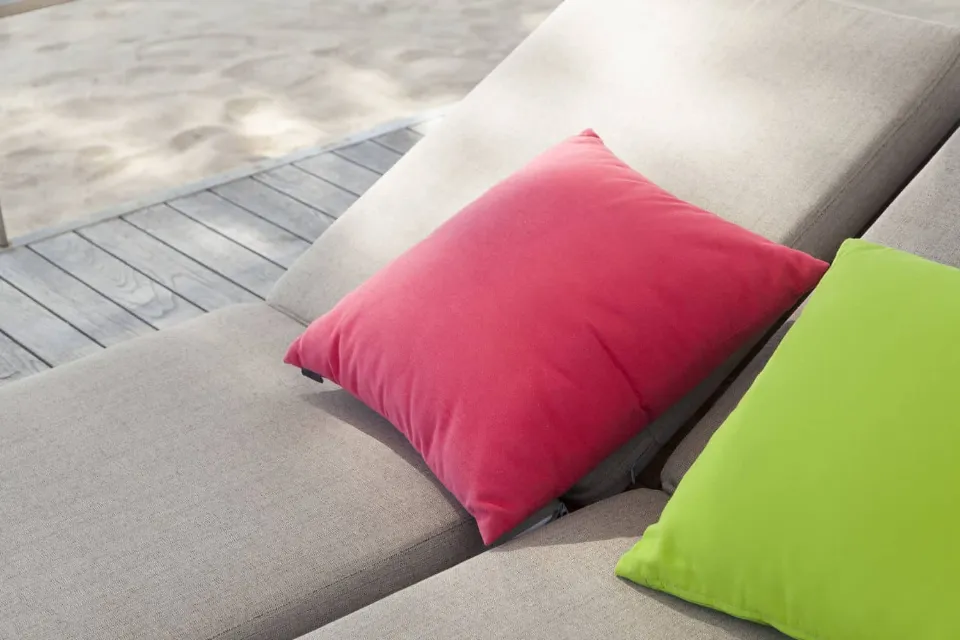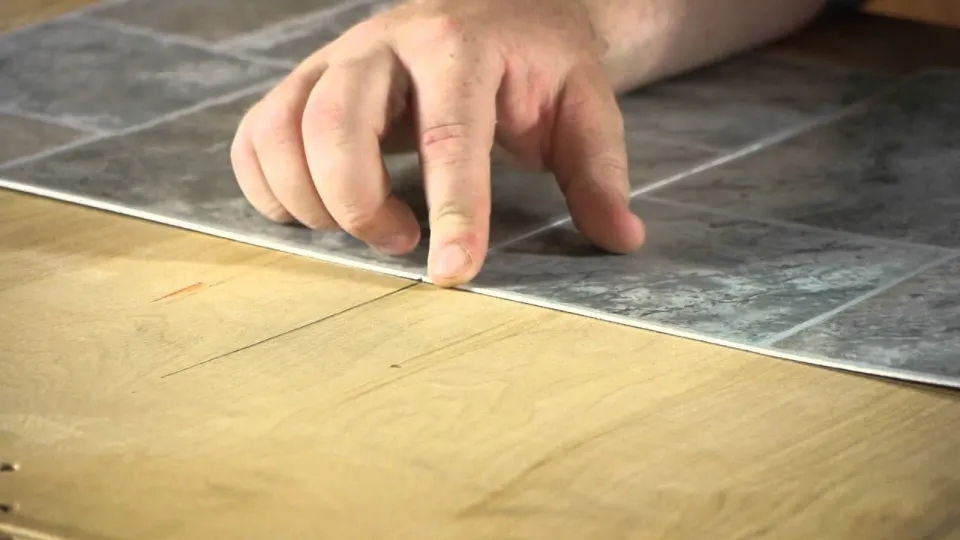Looking for an affordable alternative to hardwood or stone flooring? Want a high level of customization and design flexibility? Do you require a waterproof floor? Below will tell you the pros and cons of Vinyl Flooring.
The pros of vinyl flooring include resilient, easy to maintain, comfortable, elegant look, versatile and durable, affordable and easy installation. The cons of vinyl flooring include cannot be refinished, does not always add to resale value, discolouration, not environment-friendly, pre-installation checks, and emits VOCs.
Keep reading.
What is Vinyl Flooring?
Vinyl flooring is among the most popular types of flooring. One of the most inexpensive options available. In spite of its low cost, it is also one of the most resilient options available.
This flooring is composed of synthetic PVC material, and it has dramatically improved over the year, making it water-resistant, and it is also known to be slip-resistant.
There are other uses for vinyl besides flooring. It wasn’t until the 1860s that they started using it for flooring in their quest to create a type of flooring that was long-lasting, simple to use, and inexpensive.
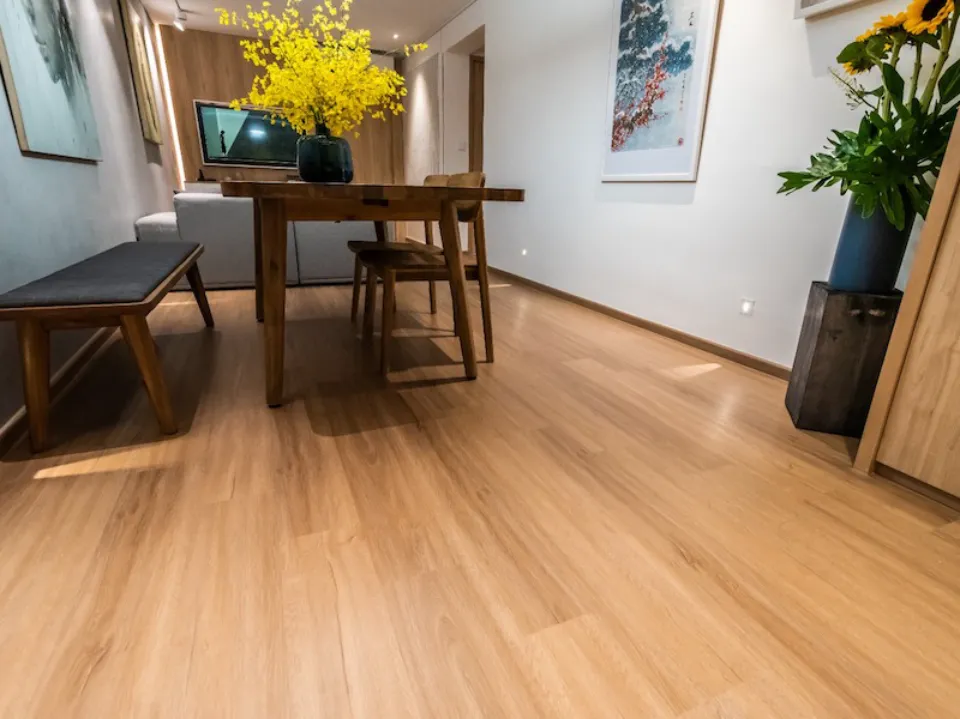
The Pros of Vinyl Flooring
Here are the pros of vinyl flooring:
Resilient
The resilience of vinyl flooring is well known. Because of its high level of durability and low maintenance requirements, vinyl flooring is typically water-resistant. Vinyl flooring, if it has a wear layer, typically won’t stain and can withstand a lot of wear and tear, making it an excellent option for any areas that get a lot of traffic. Some brands manufacture 100% waterproof vinyl floors—excellent for bathrooms or mudrooms.
Easy to Maintain
It is perfect for your home because it is water, dirt, and scratch resistant. It doesn’t need a lot of upkeep and can be kept clean by routine dusting and mopping. But make sure you don’t use mops with hard-bristled built-in scrubs. Despite being scratch-resistant, it is not completely impervious to damage.
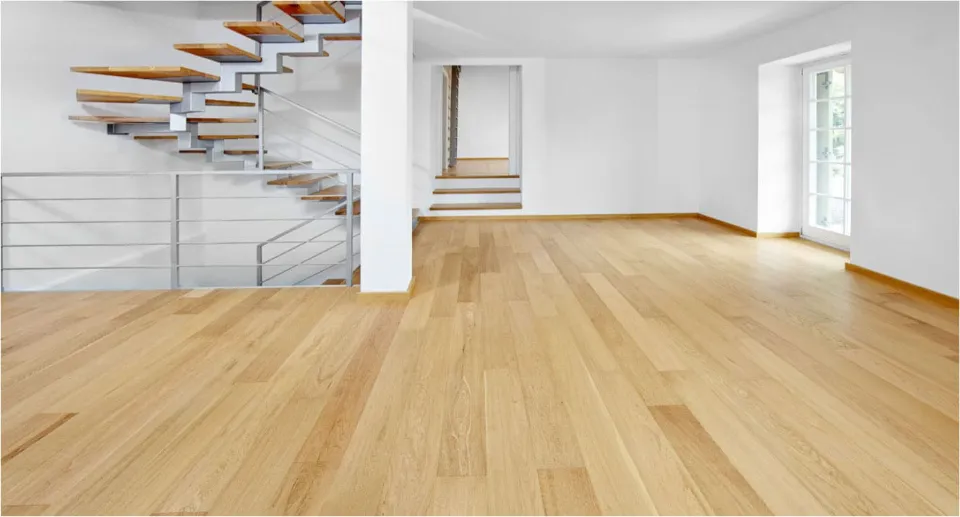
Versatile and Durable
Vinyl flooring is a durable material that is well worth the money spent on it. It is very durable and some vendors offer warranties of up to 20–25 years. Because the material is scratch-resistant and doesn’t chip or break like wood or ceramic flooring, you also can’t see any signs of wear and tear.
Comfortable
Compared to materials like hardwood or stone, vinyl flooring has a “softer” and more “padded” feeling underfoot, thanks to its layered composition. These layers also insulate and help the floor maintain a consistent temperature no matter the season. Additionally, vinyl has the potential to be soundproof, which helps any room be less noisy and echo-free.
Elegant Look
It comes in a variety of patterns, colors, styles, and designs. You can select any style of design to go with your home’s interior design. Also, it looks identical to a wood or stone finish making it hard to tell the difference between vinyl tiles and natural finishes.
Affordable and Easy Installation
Vinyl is quite affordable and has an uncomplicated installation process that can be DIYed fairly easily.
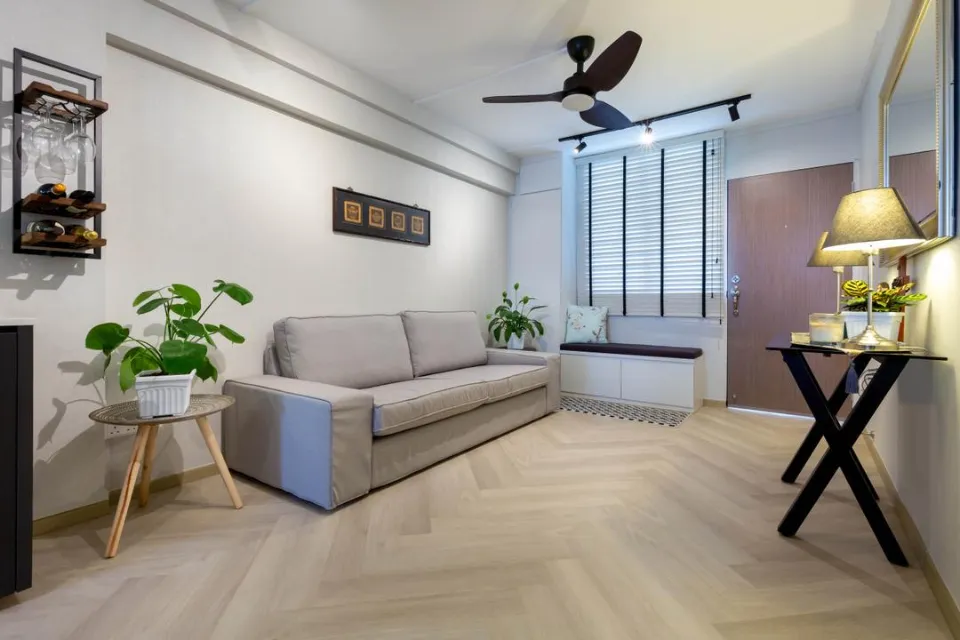
The Cons of Vinyl Flooring
Here are the cons of vinyl flooring:
Cannot Be Refinished
Vinyl flooring cannot be refinished because it has just one wear layer over the design layer. When a floor is damaged, it must either be completely replaced or just the damaged areas need to be repaired. This is especially true for vinyl sheet or inferior vinyl.
Does Not Always Add to Resale Value
Vinyl floors typically don’t affect the resale value of a home or building, though this isn’t always the case. Low-quality vinyl flooring, particularly older flooring, may even have a negative effect.
Discolouration
The finish of vinyl flooring ages over time and with repeated exposure to sunlight, which is one of its drawbacks. Although the material is sturdy, faded flooring finishes can look old and tired. Consequently, it is unsuitable for outdoor use.
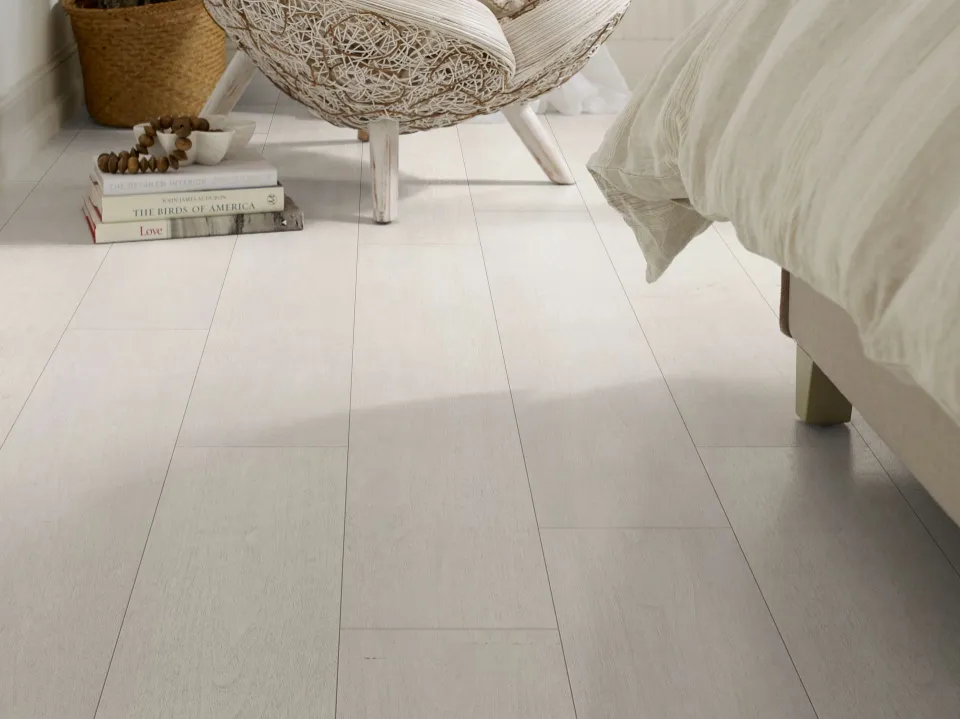
Not Environment-Friendly
The PVC that makes up the majority of it is not biodegradable. This makes it a tough choice for environment-conscious homeowners. Recycling is also a challenge. Vinyl flooring that is recyclable is only available from a few brands.
Pre-Installation Checks
Ensure that the subfloor, or the flooring on which vinyl plank flooring is installed, is free of debris and sand. If the subfloor is not thoroughly cleaned, the finish may be uneven.
Emits VOCs
Given that it is made of PVC, it is known to emit volatile organic compounds (VOCs) during installation. This reduces indoor air quality and is harmful to the inhabitants, especially kids and those with respiratory issues.
What is a Vinyl Floor Made Of?
Different materials are sandwiched together to make vinyl tiles, but PVC (polyvinyl chloride) makes up the majority of them. The market offers it as vinyl tile flooring or vinyl plank flooring. It is occasionally possible to find vinyl sheets flooring with a fiberglass cushion backed flooring.
Suggested reading: Types of flooring you can put over ceramic tile includes ceramic tiles, laminate flooring, vinyl flooring, carpet, epoxy coating, cork flooring, wood flooring, and new fired tile. But, why choose these floorings? Below will give specific reasons.
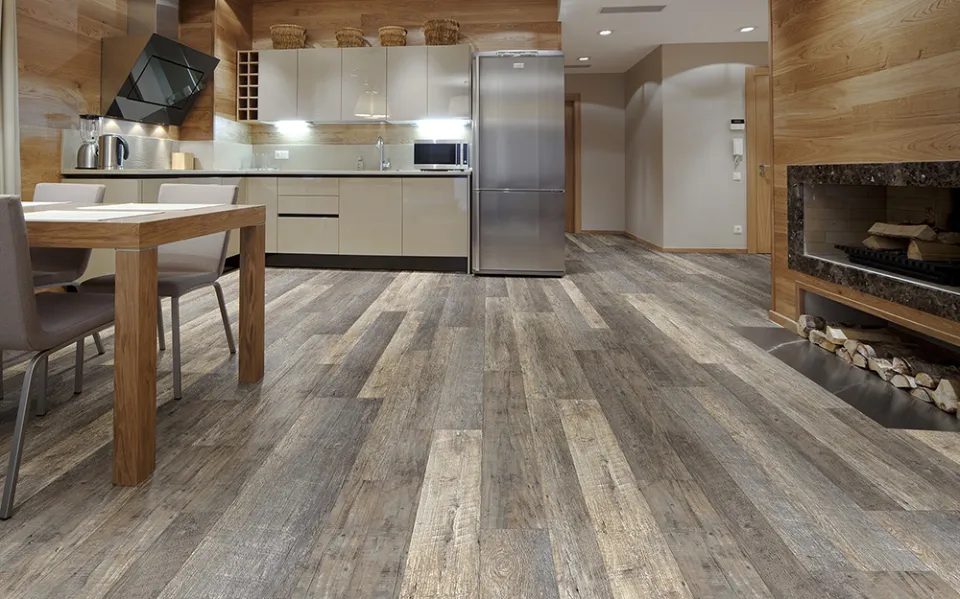
FAQs
How Long Can Vinyl Flooring Last?
Vinyl floors can last up to 20 years if installed and maintained correctly! You won’t have to spend money on periodic renovations, which is efficient. Its ease of installation is one of its benefits! You can complete it on your own by following detailed instructions.
How to Maintain Your Vinyl Flooring?
The low maintenance of vinyl flooring is one of its benefits, making it ideal for households with working parents. This flooring is also economical if you are a young professional. Just have a basic cleaning routine at home, and you are good to go!
You only need to wipe away any spills that land on the floor because it is waterproof. When cleaning your floor, you can use a vacuum and a mop because vinyl is compatible with both of these tools.
Vinyl flooring cleaning
Here are some tips to properly maintain your flooring:
- To prevent floor scuffs, use protective pads.
- Please don’t use rugs or furniture with rubber feet. It causes stains
- Avoid letting hot items touch your floor, such as your flat iron, curling iron, or charcoal.
- Never use chemicals that are highly concentrated and could stain your flooring.
To prevent damage, keep in mind that you must regularly maintain and clean your floor.
Is Vinyl Floor Better Than Tile?
Ceramic tile and vinyl plank are both regarded as long-lasting options for flooring. But over time, ceramic can fracture and chip. Vinyl plank is more resistant to damage than ceramic tile (imagine dropping something heavy on the surface). Vinyl plank is also a better option if you have children or pets.
Is HDB Vinyl Flooring Good?
Vinyl is great for bedroom floors, where you don’t expect much traffic and won’t be moving furniture around. In general, it is not advised for the living room because it dents, stains, and scratches easily. However, it is relatively water-resistant (especially if it is in sheet form) and simple to maintain.
Vinyl Flooring Cost
Vinyl can cost anywhere from $0.50 per square foot for a sheet to $5.00 per square foot for luxury planks or tiles. A good range to ballpark for quality vinyl would be between $2.50 to $5.00. A high-quality, personalized floor will cost more, as is the case with most types of flooring. Before making a decision, be sure to compare and contrast the prices of high-quality vinyl and low-cost hardwood in some cases.
Summary: Is Vinyl Flooring Good?
Vinyl flooring is one of the best options for your home given its strength, water resistance, and other advantages. In Singapore, it is also the most cost-effective choice for flooring. It is sturdy and can be used to replicate real wood or tile flooring. You can choose from a wide range of options that vary in terms of colors, designs, and patterns.
If you have any questions, please leave a comment. My Prime Home tries to give you the best home improvement information. Don’t forget to share the post. Thank you for reading.
See also:


